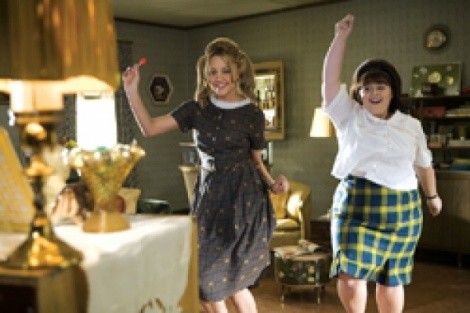
So perhaps it’s not such a bad thing that we’re seeing movie-to-Broadway-to-movie adaptations—because so far, they’ve really been quite good. This probably means we’re in for a lightning-fast double-turnaround for Legally Blonde: The Musical before too long, because that’s the tourist-trap of the moment currently infuriating New York City theatergoers lamenting the disappearance of serious theater, even as it garners decent reviews. But we’ll deal with that as it comes, because 2005’s The Producers was a delightful lark, and the staginess of its presentation nearly re-created the experience of seeing it on the Great White Way. And now there’s Hairspray, which couldn’t be more charming and joyous, more get-up-and-dance toe-tapping, more simply agreeable. If bringing Broadway to the masses works this well, well, why the hell not?
In their stage incarnations, these shows are tourists traps, no matter how enjoyable and sing-along-snappy they may be. They’re designed to be theme-park amusements for theatergoers who want to taste the roar of the greasepaint, the smell of the crowd but wouldn’t want to know from Pinter if he paused to bite them on the ass. And their bright, bubbly, don’t-force-me-to-think-too-much attitude actually works much better onscreen. Oh, sure, there’s satire galore in Hairspray, about the wages of conformity and the price of small-mindedness, but it’s couched in bouffant cotton candy and lively songs. And it’s all perfectly wonderful, as good as entertainment for the masses gets—and it’s actually in a medium better suited for it than the Broadway stage.
It’s a nice indication of how far we’ve come as a culture that there’s no hedging in the send-up of idiotic racial segregation, the crux around which Balitmorean teen Tracy Turnblad (newcomer Nikki Blonsky, who’s lovely) experiences her coming of age in 1962. She’s hooked on a local TV dance program, The Corny Collins Show, but her dreams of dancing on the show are dashed by the fact that, well, she’s a short, round little thing, and no matter how cute or vivacious she is, she’s never going to be one of the tall, willowy creatures the show favors for its girl dancers. Until, shockingly, her dream comes true when herself bustin’ a groove catches the eye of Corny (the slyly superb James Marsden), and she lands a part on his dance floor. But she can’t leave well enough alone; now she wants to integrate Corny’s show, get all the black kids out of their ghetto on the show’s once-a-month “Negro Day” and in front of the cameras every day.
Tracy isn’t so much a rabble-rouser as she is merely naïve enough not to fully grasp the implications of what she starts by wanting to dance with her black friends, who are simply fantastic dancers. The touches of ’60s cluelessness on display—the smoky teachers’ lounge at Tracy’s high school, the unused seat belts hanging out of a car—add sprigs of bitter irony. But mostly Hairspray wears its tender, sweet heart on its sleeve, singing itself hoarse on chipper tunes about being nice, being in love and being yourself no matter what anyone else thinks.
Which makes it very easy to love, utterly unchallenging but utterly unobjectionable at the same time. Even John Travolta in his drag fat suit as Edna, Tracy’s mom, is cuddly and adorable, without a whiff of anything insulting or antagonistic in his performance. If you want the John Waters’ original—which I’m guessing is more redolent of his acid humor—that one still exists. But if you want the fluffy, featherweight-but-enchanting Broadway version, here ya go.
HAIRSPRAY
Nikky Blonsky
John Travolta
James Marsden
Rated PG
cw